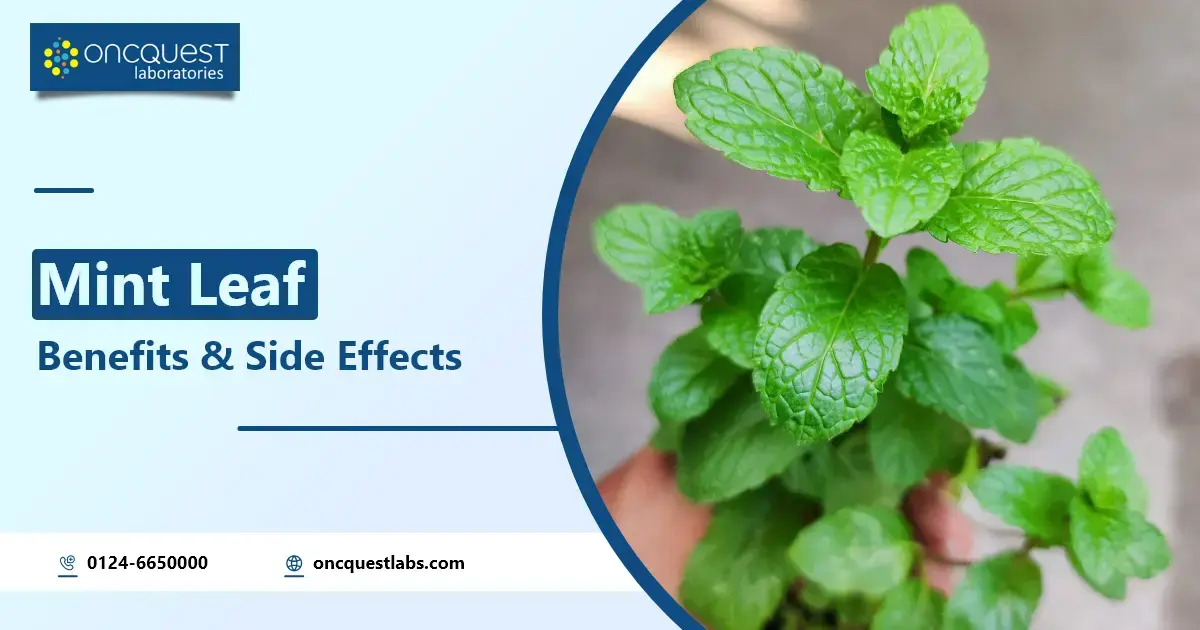Mint leaves, commonly known as pudina, are a popular herb used in cooking, beverages & traditional medicine. Mint leaves offer a refreshing flavor and numerous health benefits. However, it’s important to be aware of their potential side effects. Mint is a hardy herb that can grow in a variety of conditions but prefers:
– Cool, moist environments: Mint thrives in areas with moderate temperatures and plenty of moisture.
– Well-drained soil: While mint likes moisture, it also needs well-drained soil to prevent root rot.
– Partial shade to full sun: Mint can grow in both partial shade and full sun, though it prefers partial shade in hotter climates.
Contents
Nutrient Table of Mint Leaves (Per 100 grams)
| Nutrient | Amount | Unit |
| Calories | 44 | kcal |
| Water | 85.55 | g |
| Protein | 3.29 | g |
| Total Fat | 0.73 | g |
| Carbohydrates | 8.41 | g |
| Dietary Fiber | 6.8 | g |
| Sugars | 0.52 | g |
| Calcium | 199 | mg |
| Iron | 11.87 | mg |
| Magnesium | 63 | mg |
| Phosphorus | 60 | mg |
| Potassium | 458 | mg |
| Sodium | 31 | mg |
| Zinc | 1.09 | mg |
| Copper | 0.329 | mg |
| Manganese | 1.118 | mg |
| Vitamin C | 31.8 | mg |
| Thiamin (Vitamin B1) | 0.078 | mg |
| Riboflavin (Vitamin B2) | 0.175 | mg |
| Niacin (Vitamin B3) | 1.706 | mg |
| Vitamin B6 | 0.129 | mg |
| Folate | 114 | µg |
| Vitamin A | 4248 | IU |
| Vitamin E | 0.87 | mg |
| Vitamin K | 563.2 | µg |
Mint Leaf Benefits
1. Aids Digestion
Mint leaves aid digestion through several mechanisms. They stimulate digestive enzymes that help break down food, easing the process of digestion and reducing symptoms like bloating and indigestion. Mint’s natural oils also relax the muscles of the digestive tract, promoting smoother movement of food. Additionally, mint’s soothing properties can alleviate stomach discomfort and nausea. Whether consumed fresh, as tea, or in culinary dishes, mint is valued for its ability to support digestive health and enhance overall digestive efficiency.
2. Relieves Headaches
Mint is known for its ability to relieve headaches naturally. Its cooling effect and analgesic properties help to reduce tension and migraine headaches. Applying diluted peppermint oil to the temples or inhaling its aroma can provide quick relief. The menthol in mint acts as a muscle relaxant, easing tension in the head and neck. Additionally, mint’s anti-inflammatory properties may help reduce the intensity and duration of headaches. Incorporating mint into your routine can offer a refreshing and effective way to manage headache symptoms without relying on medication.
3. Freshens Breath
Mint effectively freshens breath due to its natural antibacterial properties and refreshing flavor. It inhibits the growth of bacteria in the mouth that cause bad breath, while its menthol content provides a cooling sensation that masks odors. Chewing on fresh mint leaves or consuming mint tea stimulates saliva production, which helps wash away food particles and bacteria. Additionally, mint’s aromatic qualities leave a pleasant scent in the mouth, making it a popular choice for oral hygiene products like toothpaste and mouthwash. Incorporating mint into your daily routine promotes long-lasting breath freshness and oral health.
4. Boosts Immunity
Mint boosts immunity through its rich content of antioxidants, vitamins, and essential nutrients. These components help strengthen the body’s defense mechanisms against infections and diseases. Mint’s antimicrobial properties inhibit the growth of harmful bacteria and viruses, contributing to overall immune health. Additionally, its anti-inflammatory effects reduce inflammation and support immune function. Consuming mint tea or adding fresh mint leaves to meals provides a natural way to bolster immunity and promote resilience against illnesses. Regular intake of mint can complement a healthy lifestyle and enhance the body’s ability to fight off infections effectively.
5. Reduces Stress
Mint reduces stress through its calming and soothing properties. The aroma of mint has been shown to lower stress levels and promote relaxation. Menthol, a natural compound in mint, acts as a muscle relaxant, easing tension and anxiety. Drinking mint tea or inhaling its scent can have a calming effect on the mind and body. Mint also contains antioxidants that combat oxidative stress and support overall mental well-being. Incorporating mint into your daily routine as a tea or in aromatherapy can provide a refreshing way to alleviate stress and promote a sense of calmness.
6. Promotes Skin Health
Mint promotes skin health through its potent antioxidant properties, which help protect skin cells from damage caused by free radicals and environmental stressors. It also has anti-inflammatory effects that can reduce skin redness, irritation, and swelling. Mint’s natural cooling sensation soothes the skin and can alleviate discomfort from conditions like sunburn or insect bites. Additionally, the menthol in mint has a refreshing effect and can help unclog pores, making it beneficial for oily and acne-prone skin. Using mint-infused skincare products or applying diluted mint essential oil topically can enhance skin hydration and overall appearance.
7. Supports Weight Loss
Mint supports weight loss through several mechanisms. It is low in calories and can be used as a flavorful substitute for high-calorie ingredients in meals and beverages. Mint stimulates the digestive enzymes that aid in nutrient absorption and digestion, promoting efficient metabolism. Its natural appetite-suppressant properties help curb cravings and reduce overall food intake. Additionally, mint tea can be a hydrating and refreshing alternative to sugary beverages, supporting a balanced diet. Regular consumption of mint, whether fresh or as tea, can complement a healthy lifestyle focused on weight management and overall well-being.
8. Alleviates Allergies
Mint alleviates allergies through its natural antihistamine and anti-inflammatory properties. The menthol in mint acts as a decongestant, helping to clear nasal passages and reduce respiratory symptoms such as congestion and sneezing. Mint’s anti-inflammatory effects can also soothe irritated airways and reduce the intensity of allergic reactions. Consuming mint tea or inhaling its steam can provide relief from allergy symptoms. Additionally, mint’s antioxidant content supports immune function, helping the body better cope with allergens. Including mint in your diet or using mint-infused products can offer a natural approach to managing allergy symptoms effectively.
9. Improves Respiratory Health
Mint leaves have a refreshing effect that can help clear the respiratory tract. The menthol in mint acts as a natural decongestant, relieving symptoms of asthma, bronchitis, and other respiratory conditions. Inhaling steam infused with mint leaves can help ease breathing difficulties.
10. Enhances Cognitive Function
Mint enhances cognitive function through its various beneficial properties. The aroma of mint has been shown to improve focus, concentration, and alertness, making it useful for tasks requiring mental clarity. Menthol, a key component in mint, stimulates the hippocampus—the brain area involved in memory and learning. This stimulation can enhance cognitive performance and memory retention. Mint’s antioxidant properties also protect brain cells from oxidative stress, potentially reducing the risk of cognitive decline. Incorporating mint into your daily routine, whether through tea, aromatherapy, or culinary use, can support overall cognitive function and mental acuity.
Side Effects of Mint Leaves
1. Heartburn
Heartburn, a common digestive discomfort, occurs when stomach acid backs up into the esophagus, causing a burning sensation in the chest or throat. Mint, while often soothing for digestion, may exacerbate heartburn in some individuals due to its relaxing effect on the lower esophageal sphincter, which can allow stomach acid to reflux. If prone to heartburn, it’s advisable to consume mint in moderation or opt for peppermint-free alternatives to manage symptoms effectively and maintain digestive comfort.
2. Allergic Reactions
Mint may trigger allergic reactions in sensitive individuals, although it is less common compared to other allergens. Allergic reactions to mint can manifest as skin irritation, hives, or respiratory symptoms like wheezing or nasal congestion. Cross-reactivity with other herbs in the mint family, such as basil or oregano, can also occur. If allergic symptoms develop after consuming mint or using mint-infused products, it’s essential to discontinue use and consult a healthcare provider. Avoiding mint and its derivatives is advisable for those with known allergies to ensure safety and prevent allergic reactions.
3. Lower Blood Sugar Levels
Mint may help lower blood sugar levels due to its beneficial properties. Research suggests that compounds found in mint leaves, such as polyphenols and flavonoids, can improve insulin sensitivity and reduce blood sugar levels. Mint tea or extracts may aid in regulating glucose metabolism after meals, potentially benefiting individuals with diabetes or prediabetes. However, it’s important to note that while mint shows promise in this regard, it should not replace prescribed diabetes medications without medical guidance. Monitoring blood sugar levels and consulting a healthcare provider are crucial for managing diabetes effectively while incorporating mint into a balanced diet.
4. Pregnancy Concerns
During pregnancy, concerns regarding the consumption of mint primarily revolve around its potential effects on uterine tone and hormonal balance. While mint is generally considered safe in moderate amounts, excessive consumption or concentrated forms like essential oils may pose risks. Menthol, a compound in mint, can relax muscles, including the uterus, potentially leading to complications such as premature contractions. Additionally, mint’s impact on hormone levels is not well-studied during pregnancy, raising caution about its use. Pregnant individuals should consult healthcare providers before using mint products to ensure safety and mitigate potential risks to maternal and fetal health.
5. Interactions with Medications
Mint may interact with certain medications due to its effects on enzymes in the liver that metabolize drugs. It can potentially affect the absorption or breakdown of medications, altering their effectiveness or increasing the risk of side effects. For example, mint supplements or extracts may interact with medications for acid reflux, diabetes, or blood thinners. It’s crucial to consult healthcare providers before using mint products alongside medications to avoid potential interactions. Monitoring by medical professionals ensures safe and effective management of health conditions while incorporating mint into your routine.
6. Oral Irritation
Mint can sometimes cause oral irritation, particularly in individuals with sensitive gums or mucous membranes. The menthol and other compounds in mint can be strong and may cause a burning sensation or mild irritation in the mouth or throat, especially when consumed in high concentrations or used in concentrated forms like essential oils. This irritation is usually temporary and mild but can be uncomfortable for some people. Diluting mint extracts or reducing the frequency of use can help mitigate oral irritation while still enjoying the benefits of mint for fresh breath and oral health.
7. Kidney Stones
Mint is generally considered safe for consumption and is not known to directly cause kidney stones. However, some individuals may have concerns due to its oxalate content. Oxalates are naturally occurring compounds found in many foods, including mint, that can contribute to the formation of kidney stones in susceptible individuals. To minimize the risk, those prone to kidney stones should consume mint in moderation and ensure adequate hydration. Consulting a healthcare provider for personalized dietary advice is advisable to manage kidney stone risk effectively while enjoying the benefits of mint.
8. Gastrointestinal Issues
Mint can occasionally exacerbate gastrointestinal issues, particularly in individuals with sensitive digestive systems. While mint is often used to soothe digestive discomfort, such as bloating and indigestion, it may also relax the lower esophageal sphincter, allowing stomach acid to reflux and potentially worsening heartburn or acid reflux symptoms. Additionally, consuming large amounts of mint or concentrated forms like essential oils can lead to digestive upset, including nausea or stomach cramps. Moderation and mindful consumption of mint can help mitigate gastrointestinal issues while still benefiting from its digestive soothing properties.
9. Decreased Iron Absorption
Mint may decrease iron absorption due to its high content of compounds known as polyphenols. These compounds can bind to iron in the gastrointestinal tract, forming complexes that are less readily absorbed by the body. This effect could potentially lead to lower levels of iron uptake from foods consumed concurrently with mint. For individuals with iron deficiency or anemia, especially pregnant women or those at risk, it’s advisable to consume mint separately from iron-rich foods or supplements. Consulting with a healthcare provider or registered dietitian can provide personalized guidance on managing iron absorption while incorporating mint into the diet.
10. Infants and Young Children
For infants and young children, caution is advised when introducing mint due to potential sensitivities and reactions. While mint is generally safe in small amounts, excessive consumption or concentrated forms like essential oils can be harsh on delicate digestive systems and may cause discomfort or allergic reactions. It’s recommended to start with small quantities and observe for any adverse reactions. Consulting pediatric healthcare providers before introducing mint can ensure it aligns with the child’s developmental stage and health status, promoting safe and appropriate use while considering potential risks.
Mint Leaves Benefits for Weight Loss
Mint leaves offer several benefits that can support weight loss efforts. Firstly, mint is low in calories and can be used to add flavor to meals and beverages without significantly increasing caloric intake. It aids digestion by stimulating the production of digestive enzymes, which helps the body break down food more efficiently and may reduce bloating and indigestion that can contribute to weight gain. Mint’s natural appetite-suppressing properties can help curb cravings and reduce overall food intake. Additionally, consuming mint tea or infused water can promote hydration and reduce the consumption of sugary beverages, supporting a calorie-controlled diet essential for weight loss. However, while mint can be a helpful addition to a weight loss regimen, it’s important to adopt a balanced diet and regular exercise for sustainable results.
Conclusion
Mint leaves are a wonderful herb with numerous health benefits. They can improve digestion, relieve headaches, freshen breath, and even help in weight loss. However, it’s important to consume them in moderation to avoid potential side effects such as heartburn, allergies, and interactions with medications. Always consult with a healthcare professional if you have any concerns about adding mint leaves to your diet.
FAQ’s
1. What are the primary health benefits of mint leaves?
Mint leaves offer a variety of health benefits, including aiding digestion, relieving headaches, and freshening breath. They are rich in vitamins and antioxidants, which boost the immune system and help fight infections. Additionally, mint leaves can reduce stress, promote skin health, support weight loss, alleviate allergies, improve respiratory health, and enhance cognitive function.
2. Can consuming mint leaves help with weight loss?
Yes, consuming mint leaves can aid in weight loss. Mint leaves improve digestion and metabolism, helping the body to break down fats and proteins more efficiently. Drinking mint tea or incorporating fresh mint leaves into your diet can be a healthy addition to a weight loss regimen. However, it’s important to combine mint consumption with a balanced diet and regular exercise for the best results.
3. Are there any side effects of consuming mint leaves?
While mint leaves are generally safe for most people, excessive consumption can lead to side effects such as heartburn, allergic reactions, and gastrointestinal issues. Mint leaves can also lower blood sugar levels, interact with certain medications, and contribute to kidney stones in susceptible individuals. Pregnant women and those with specific health conditions should consult a healthcare provider before consuming mint leaves.
4. How can I use mint leaves in my daily diet?
Mint leaves can be used in a variety of ways in your daily diet. They can be added fresh to salads, smoothies, and beverages for a burst of flavor. Mint leaves are also commonly used in cooking, particularly in dishes like soups, stews, and sauces. Additionally, you can make mint tea by steeping fresh or dried mint leaves in hot water, which is both refreshing and beneficial for health.
5. Is it safe to consume mint leaves during pregnancy?
While moderate consumption of mint leaves is generally considered safe during pregnancy, it’s important to be cautious. Large amounts of mint can lead to uterine relaxation and increase the risk of miscarriage, especially in the early stages of pregnancy. Pregnant women should consult with their healthcare provider before incorporating mint leaves into their diet to ensure safety.





